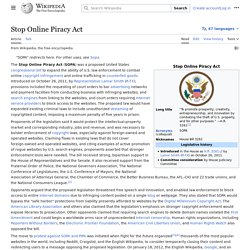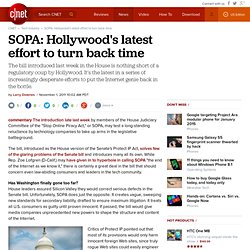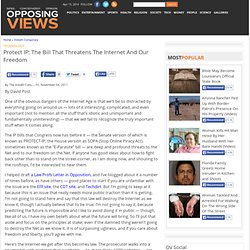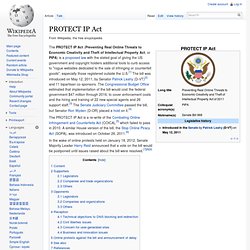

PROTECT IP Renamed E-PARASITES Act; Would Create The Great Firewall Of America. Stop Online Piracy Act. Proponents of the legislation said it would protect the intellectual-property market and corresponding industry, jobs and revenue, and was necessary to bolster enforcement of copyright laws, especially against foreign-owned and operated websites.

Claiming flaws in present laws that do not cover foreign-owned and operated websites, and citing examples of active promotion of rogue websites by U.S. search engines, proponents asserted that stronger enforcement tools were needed. Opponents claimed that the proposed legislation threatened free speech and innovation, and enabled law enforcement to block access to entire internet domains due to infringing content posted on a single blog or webpage.
They expressed concerns that SOPA would bypass the "safe harbor" protections from liability presently afforded to websites by the Digital Millennium Copyright Act. Overview[edit] SOPA: Hollywood's latest effort to turn back time. Commentary The introduction late last week by members of the House Judiciary Committee of the "Stop Online Piracy Act," or SOPA, may test a long-standing reluctance by technology companies to take up arms in the legislative battleground.

The bill, introduced as the House version of the Senate's Protect IP Act, solves few of the glaring problems of the Senate bill and introduces many all its own. While Rep. Zoe Lofgren (D-Calif.) may have given in to hyperbole in calling SOPA "the end of the Internet as we know it," there is certainly a great deal in the bill that should concern even law-abiding consumers and leaders in the tech community.
Has Washington finally gone too far? House leaders assured Silicon Valley they would correct serious defects in the Senate bill. Critics of Protect IP pointed out that most of its provisions would only harm innocent foreign Web sites, since truly rogue Web sites could easily engineer around all of its provisions. Hollywood vs. Protect IP: The Bill that Threatens the Internet and Our Freedom. By David Post One of the obvious dangers of the Internet Age is that we’ll be so distracted by everything going on around us — lots of it interesting, complicated, and even important (not to mention all the stuff that’s idiotic and unimportant and fundamentally uninteresting) — that we will fail to recognize the truly important stuff when it comes along.

The IP bills that Congress now has before it — the Senate version of which is known as PROTECT-IP, the House version as SOPA (Stop Online Piracy Act), sometimes known as the “E-Parasite” bill — are deep and profound threats to the Net and to our freedom on the Net. If anyone has good ideas about how to fight back other than to stand on the street-corner, as I am doing now, and shouting to the rooftops, I’d be interested to hear them. Here’s the Internet we get after this becomes law. The prosecutor walks into a courtroom with evidence that a website — or, more likely, 1000 websites — are “dedicated to infringing activities.” Protect IP Act. The PROTECT IP Act is a re-write of the Combating Online Infringement and Counterfeits Act (COICA),[5] which failed to pass in 2010.

A similar House version of the bill, the Stop Online Piracy Act (SOPA), was introduced on October 26, 2011.[6] In the wake of online protests held on January 18, 2012, Senate Majority Leader Harry Reid announced that a vote on the bill would be postponed until issues raised about the bill were resolved.[7][8][9] Content[edit] The bill defines infringement as distribution of illegal copies, counterfeit goods, or anti-digital rights management technology. Infringement exists if "facts or circumstances suggest [the site] is used, primarily as a means for engaging in, enabling, or facilitating the activities described Supporters[edit] Legislators[edit] The PROTECT IP Act has received bipartisan support in the Senate, with introduction sponsorship by Senator Patrick Leahy (D-VT), and, as of December 17, 2011, co-sponsorship by 40 Senators.[20]